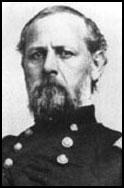Don Carlos Buell

Don Carlos Buell was born in Marietta, Ohio, on 23rd March, 1818. He graduated from West Point in 1841, and saw action in the Seminole War (1838-42) and the Mexican War (1846-48). For the next twelve years he served in the United States Army and eventually reached the rank of assistant adjutant general.
On the outbreak of the American Civil War Buell helped organize Union Army troops around Washington. In August, 1861 he was given command of a division of the Army of Potomac and in November succeeded William Sherman as head of the Department of the Ohio. He also took part in the battle at Shiloh but as a result of the campaign led by Braxton Bragg, was forced to retreat from central Tennessee. After the battle of Perryville (October, 1862), Buell was replaced by William Rosecrans.
Complaints were made against Buell's unwillingness to follow orders from Washington and in November, 1862, Lewis Wallace was asked to led and investigation into the case. The report was never published but was thought to be highly critical of Buell's decision at Perryville not to pursue the retreating enemy. Despite the efforts by Ulysses S. Grant, Buell was never offered another command and he resigned from the army in June, 1864.
After the war Buell moved to Kentucky and became president of the Green River Iron Company. Don Carlos Buell died in Rockport, Kentucky, on 19th November, 1898.
Primary Sources
(1) Ulysses Grant, Personal Memoirs of U. S. Grant (1885)
General Buell was a brave, intelligent officer, with as much professional pride and ambition of a commendable sort as I ever knew. I had been two years at West Point with him, and had served with him afterwards, in garrison and in the Mexican War, several years more. He was not given in early life or in mature years to forming intimate acquaintances. He was studious by habit, and commanded the confidence and respect of all who knew him. He was a strict disciplinarian, and perhaps did not distinguish sufficiently between the volunteer who "enlisted for the war" and the soldier who serves in time of peace.
General Buell became an object of harsh criticism later, some going so far as to challenge his loyalty. No one who knew him ever believed him capable of an dishonorable act, and nothing could be more dishonorable than to accept high rank and command in war and then betray the trust. When I came into command of the army in 1864, I requested the Secretary of War to restore General Buell to duty.

